Dying for the Bible
Is the Bible worth dying for? Many who call themselves Christians today do not think it is. The Bible to many is simply a good book among many, but not the Book which is holy and heavenly—the 100% perfect Word of God without any mistake.
The Christians of olden days did not think like this. They believed the Bible with all their heart and were prepared to die for it. Who were these Bible believers who gladly risked their lives to teach the Bible and defend the Bible? Let me share with you the Bible-believing faith of the Waldenses, the Albigenses and the Lollards, “of whom the world was not worthy” (Heb 11:38).
The Waldenses
The Waldenses were followers of Peter Waldo. Peter Waldo was a wealthy merchant. He wanted to read the Bible for himself. In 1170, he employed a priest to translate the Four Gospels into French. He read the Gospels, and by the grace of God became a believer of Jesus Christ. He learned that the Bible alone was his sole and supreme basis of faith and practice, and not any man whether pope or king. He learned that Jesus Christ was the only Mediator, and not the saints for none of them could do anything for a person’s salvation and were not to be worshipped.
Having experienced salvation, he was eager to share the gospel to others. So in 1177, he organised a society of men and women who were likewise saved and willing to preach the good news. These Waldenses who were named after their founder were also called “the poor men of Lyons” because they wanted to obey what Jesus taught in Luke 10:2-4,“The harvest truly is great, but the labourers are few: pray ye therefore the Lord of the harvest, that he would send forth labourers into his harvest. Go your ways: behold, I send you forth as lambs among wolves. Carry neither purse, nor scrip, nor shoes: and salute no man by the way.”
They went about selling odds and ends and shared the gospel to those who would hear them. They preached boldly and exposed the errors of the Roman Catholic Church (RCC). They evangelised the whole of Southern France, Switzerland and Northern Italy. They were quite well received, and gathered those of the same mind to worship in secluded places. They conducted Bible studies in homes and made sure they left portions of the Bible and devotional materials to those who wished to learn more of the truth.
When the RCC saw that the Waldenses were winning more and more converts, they banned them from evangelising. In 1229, they made the reading of the Bible illegal and placed the Bible in the Index of Forbidden Books. They then began a wicked programme of extermination by using the Inquisition to arrest and execute all who read the Bible, preached the gospel and defended the faith. Many thousands were tortured, treated cruelly and slain. Even mothers with babies were thrown down the cliffs of the Piedmont mountains where the Waldenses sought refuge.
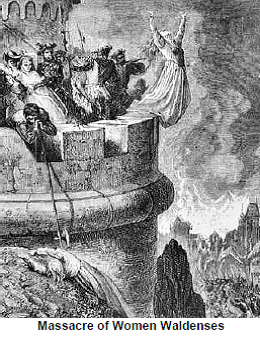
Although their enemies persecuted them and tried to destroy them, they could not deny that these Christians lived a morally pure life and were very sincere in holding fast to their convictions to follow only Christ and believe only His Word.
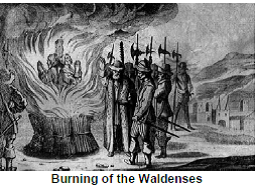
John Milton wrote a hymn in memory of the Waldenses who suffered and died for Christ and His Word. Entitled “On the late massacre in Piedmont (1655)”, the lyrics went like this:
Avenge, O Lord, thy slaughtered saints, whose bones
Lie scattered on the Alpine mountains cold;
Even them who kept thy truth so pure of old
When all our fathers worshipped stocks and stones,
Forget not: in thy book record their groans
Who were thy sheep, and in their ancient fold
Mother with infant down the rocks. Their moans
To heaven. Their martyred blood and ashes sow
O’er all the Italian fields, where still doth sway
The triple tyrant; that from these may grow
A hundredfold who, having learnt thy way,
Early may fly the Babylonian woe.
The Albigenses
The Albigenses were from Albi, a city in Southern France. The Albigenses based their beliefs solely on the authority of the Bible. They protested against the doctrinal and ethical corruptions of the RCC. They did not consider the priests of the RCC to be worthy of respect because of their false teachings and immoral lifestyle.
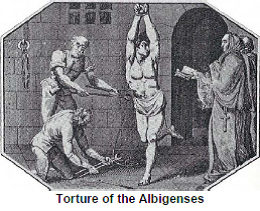
The RCC charged the Albigenses with heresy and used the Inquisition to silence them. They were very successful in their cruel campaign against these Bible believers. The persecution went on for two decades and the Albigenses were almost wiped out. Archbishop Trench wrote, “The machinery, so wonderful in its wickedness and its craft, did not fail in its object. … By the middle of the fourteenth century there were probably few Albigenses more.”
Was the Christian faith defeated? No, not at all! Church historian A M Renwick wrote, “It is certain that, although outwardly suppressed, the spirit of these persecuted sects continue to live in the hearts of the people till the Reformation.”
Many of these Protestants and Reformers were denounced as “heretics” by the RCC. But Renwick rightly cautioned, “Much historical research is still called for in order to bring out the true story and the theological position of those numerous bodies. … past historians have depended too much on the statements of the enemies of the dissenting groups for their assessment of their doctrine and morals.”
The Lollards
The Lollards were followers of John Wycliffe (1320-1384). Wycliffe believed the Bible to be God’s infallible and authoritative Word. Wycliffe taught that the Bible was to be believed, not the sayings of the pope. Wycliffe also opposed the superstitious and power-hungry priests, monks, and friars of the RCC. The pope ordered Wycliffe to stop teaching his personal convictions as truth. He also ordered the excommunication and execution of all who taught or defended Wycliffe’s views. This threat did not deter Wycliffe from defending the faith. Gifted with a sharp pen, he continued to write in defence of the truth.
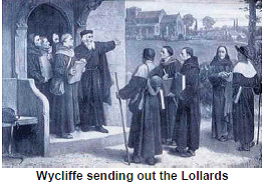
Wycliffe realised that the best way to free the people from the shackles of Rome was to let the people read the Bible for themselves. Wycliffe was the first to translate the whole Bible into English. The translation was done from the Latin Vulgate. Although the translation was not as accurate as could be since it was not from the Hebrew and Greek Scriptures, it was accurate enough for God’s purpose to be fulfilled. At long last, the people could finally read for themselves the truth of salvation by grace through faith in Christ alone.
The Lollards used Wycliffe’s translation to read and preach the Word to the common folk. For reading the Bible and preaching the gospel to the people, many of these Lollards were burned to death.
In 1401 a wicked and cruel Act was passed by the English Parliament. All charged with heresy were to be burned to death. The first man thrown into the flames was William Sawtree a pastor in London. He was burned to death at Smithfield in February 1401 all because he said, “I would not worship the cross, but only the Christ who died on the cross.”
Another example was Lord Cobham. He was a man of means. He opened his castle home to the Lollard preachers and protected them. He financed the copying of Wycliffe’s Bible and his writings, and made sure they were circulated far and wide. For this he was arrested and put on trial. In the trial, he was ordered by the Archbishop to affirm all the doctrines of the RCC. Lord Cobham replied, “I refuse to believe any doctrine that is contrary to Scripture.” The Archbishop then ordered him to confess his sins. Lord Cobham replied, “I will not confess to you, but I will confess all my many sins to God; only God can forgive sins.” When told to worship relics and images, Lord Cobham said, “The Church is making a lot of money out of relics and images, but God has forbidden the worship of these things—it is idolatry!” The Archbishop sentenced him to death. On 14 December 1417, he was cruelly hooked up over burning coals of fire and roasted to death.
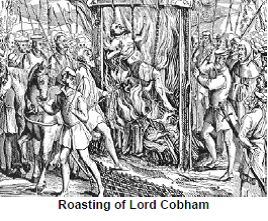
Are you a friend or an enemy of the Bible? Believers and defenders of the Reformation Bible who say that it is 100% preserved and thus 100% perfect without any mistake are today falsely accused of “heresy”. Although the enemies of God and of His Gospel have spared no effort to destroy the historic Christian Faith and all Bible believers throughout the centuries, the Reformation Bible still stands, and faith is the victory. JK


